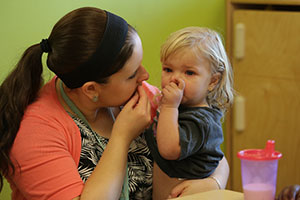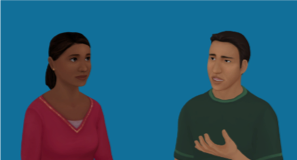Zero to Three Sparks Video Series for Families on Child Development
Zero to Three Sparks Video Series for Families on Child Development
As an early childhood provider, you may hear parents wondering how their child is learning and growing at different stages. The Sparks video series is a free resource for parents that blends health, safety, sleep and nutrition topics with practical ways to promote children’s healthy learning and development
These videos were created by a diverse team of physicians and developmental experts from across the country. Each Sparks video goes hand-in-hand with a child’s check-up from birth to age 5 and can help caregivers know what to expect in the next stage of child development. Check out the videos and visit the Sparks website for more information.
25 Questions Early Childhood Professionals Should Ask Families
Today’s families are increasingly complex and diverse—and as a professional working with young children, you’ll need to gather a solid foundation of information as you partner with their families. This post includes a helpful list of 25 important questions to ask when you meet with a young child’s family. Excerpted and adapted from Understanding Families, Second Edition, by Marci J. Hanson, & Eleanor W. Lynch, these questions are a great starting point for learning about children and families and preparing yourself to meet their needs.
Engaging Families in Healthy Development – Get your FREE Family Toolkit
Adapted from the trusted Ages & Stages Questionnaires (ASQ®) family of products, this toolkit of resources will help you engage families in nurturing their child’s developmental and social-emotional skills. Families will get:
- Tips and guidelines on supporting the healthy development of infants, toddlers, and preschoolers
- Pages of fun, easy, and low-cost learning activities that boost key developmental skills
- A quick-guide to some of the most commonly asked questions about ASQ screening
- Links to more tips and activities on the Brookes Publishing blog Share these resources with the families you work with, and help them get their children off to the best start in life!
CDC and the American Academy of Pediatrics Update Developmental Milestones
The Centers for Disease Control and Prevention (CDC) and the AAP have revised developmental milestones in the Learn the Signs. Act Early. program, which helps parents identify autism and developmental delays in their children.
The revised developmental milestones are written in family-friendly language and identify the behaviors that 75% or more of children can be expected to exhibit at a certain age based on data, developmental resources and clinician experience.
“The earlier a child is identified with a developmental delay the better, as treatment as well as learning interventions can begin,” Dr. Paul Lipkin, a member of the AAP who assisted with the revisions, said in a press release. “At the same time, we don’t want to cause unnecessary confusion for families or professionals. Revising the guidelines with expertise and data from clinicians in the field accomplishes these goals. Review of a child’s development with these milestones also opens up a continuous dialogue between a parent and the health care provider about their child’s present and future development.”
The process behind the revised milestones is detailed in an article titled “Evidence-Informed Milestones for Developmental Surveillance Tools” published in Pediatrics Tuesday. For a complete description of the changes read the entire article here.
Explore the Learn the Signs Act Early menu of tools and training associated with the Milestones, including the free downloadable poster, Milestones Matter, shown as part of this article.
Head Start ECLKC: Disabilities Services Newsletters – When Concerns Arise
The Head Start Disabilities Services Newsletter is produced monthly by the National Center on Early Childhood Development, Teaching, and Learning (NCECDTL). It is dedicated to staff working with young children with disabilities and their families. The selection of newsletters below focus on topics covering When Concerns Arise.
- Partnering with Families to Identify Developmental Concerns June 2019
 This newsletter provides a case study, important considerations for dual language learners, tools and training modules to support a child care provider is identifying developmental concerns. One of the training modules is below, but review the entire newsletter to get a better understanding of all that’s involved in this process.
This newsletter provides a case study, important considerations for dual language learners, tools and training modules to support a child care provider is identifying developmental concerns. One of the training modules is below, but review the entire newsletter to get a better understanding of all that’s involved in this process. - Relationship-based Practices: Talking with Families about Developmental Concerns (Training Module) June 2019
 Engaging parents in collaborative conversations about screenings and referrals is more than just having a meeting or completing a form; it’s an ongoing process and an essential part of our relationship with families. It requires careful relationship-building in order for any conversations like this to take place, so that concerns can be addressed within the context of a trusting relationship. It’s reassuring for the parent to know that you are in this together, and that they are not alone in trying to figure this out. This training simulation outlines 6 relationship-based practices that will help you work with the family to explore concerns.
Engaging parents in collaborative conversations about screenings and referrals is more than just having a meeting or completing a form; it’s an ongoing process and an essential part of our relationship with families. It requires careful relationship-building in order for any conversations like this to take place, so that concerns can be addressed within the context of a trusting relationship. It’s reassuring for the parent to know that you are in this together, and that they are not alone in trying to figure this out. This training simulation outlines 6 relationship-based practices that will help you work with the family to explore concerns.
Milestone Tracker Mobile App
Milestones matter! Track your child’s milestones from age 2 months to 5 years with CDC’s easy-to-use illustrated checklists; get tips from CDC for encouraging your child’s development; and find out what to do if you are ever concerned about how your child is developing. From birth to age 5, your child should reach milestones in how he or she plays, learns, speaks, acts, and moves. Photos and videos in this app illustrate each milestone and make tracking them for your child easy and fun!
American Academy of Pediatrics Early Childhood Screening
The Screening in Practices Initiative offers information and resources, including screening recommendations, practice tools, and individualized assistance, to help pediatric health care providers implement effective screening, referral, and follow-up for developmental milestones, maternal depression, and social determinants of health.
HealthyChildren.org
- Does My Child Have Physical Developmental Delays? Oct 2018
This publication from the National Center on Parent, Family and Community Engagement explores how understanding the cultural perspectives of families can positively impact relationship-building and family engagement efforts. The publication includes a set of reflective questions that help you to examine your perspective on a topic and a family’s perspective. - How to Raise Concerns about a Child’s Speech and Language Development: Do’s and Don’ts
Healthy Children.org, sponsored by the American Academy of Pediatrics, provides some do’s and don’ts for talking respectfully and productively about a potential communication delay. - Spanish Translation: HealthyChildren.org
Developmental and Behavioral Screening Guide for Early Care and Education Providers
Developmental and Behavioral Screening Guide for Early Care and Education Providers was developed by the California Statewide Screening Collaborative and funded by the California Department of Developmental Services (DDS) Early Start and Health Services Section through its Race to the Top–Early Learning Challenge grant and produced by the WestEd Center for Prevention & Early Intervention under contract to DDS. This guide is designed to increase awareness of and access to screening, services and supports, and referral resources that are available for California’s young children and their families.The first section contains an overview and discussion of the provider’s role in screening and monitoring within the context of early care and education settings. The second section features a comprehensive list of developmental and behavioral screening resources that are available online.
Bringing the Signs of Early Autism into Focus Video Tutorial (Video)
Published: Jun 2013 | 9 minutes
The Kennedy Krieger Institute and Maryland Chapter of the American Academy of Pediatrics (AAP) have published a free online video to improve the recognition of the early signs of autism spectrum disorders (ASDs) among pediatricians, parents and early intervention providers. The tutorial consists of six video clips that compare toddlers with no signs of ASD to toddlers with early signs of ASD and includes an explanation of how the specific behaviors exhibited by each child are either suggestive of ASD or typical child development.